The Eve of Indonesian Independence: A Local Coup
В stories There is one funny moment of Indonesian independence that even has an official name – the Rengasdengklok Incident (Peristiwa Rengasdengklok). According to the official version, on the night of August 16, 1945, that is, the day before the declaration of independence, a group of young radicals who served in the pro-Japanese PETA army kidnapped Sukarno with his wife and son, Muhammad Hatt and some others, brought them to this very Rengasdengklok, to force them to quickly declare the independence of the country.
This is a state historical myth. Moreover, it is intended to disguise something, or rather, to replace the interpretation of one of the historical events from what actually happened to what would be appropriate from the point of view of the Indonesian government. There is no particular damage from this myth, most of even those who are well versed in the history of this wonderful country, and there are not so many of them, simply skip this episode as insignificant and incomprehensible.
Incomprehensible ... Here, the illogicality of this event has always struck me. It was Sukarno who had to be persuaded and even persuaded under threat to proclaim the independence of Indonesia?! Sukarno began the struggle for independence in 1926, in 1927 he created the National Party of Indonesia, and from 1929 to 1942 he was almost constantly in jail and in exile for the fight against Dutch rule. After all this, we are told that literally on the eve of this event, it turns out that Sukarno had to be kidnapped and threatened in order to persuade him to declare independence as soon as possible? Brad, and only.
Valuable Memories
All materials about this case, which can now be found on the Internet, even in Indonesian, in one way or another go back to a number of publications in the official media. The Indonesian Ministry of Education and Culture explained how this event should be interpreted. In other words, this nonsense is official. Of course, this has its reasons, but now we are not talking about that.
In the Eastern Department of the RSL, I was lucky to find a rare book published in Bandung in 1955: "Tjatatan ringkas tentang: PETA ("Pembela Tanah Air") dan Peristiwa Rengasdengklok". It seems that this book is a rarity in Indonesia as well. It was written by Umar Bahsan, who was the commander of the 2nd platoon of the 2nd company of the 2nd Jakarta battalion of PETA, in September 1944, redeployed from Jakarta to the area west of the capital. Bakhsan was not only an eyewitness, but also a direct participant in the events of August 16, 1945, only he tells a completely different story.
The event area is an area west of Jakarta. The battalion companies were located in different places. 3rd and 4th companies - in Purvakarta, 82 km from Jakarta. 74 km from Jakarta, on the road to Bandung and Semarang, Japanese troops were located in Chikampkek. The 1st company of the PETA battalion was in Chilamaya, which is northeast of Chikampek, 92 km from Jakarta, and the 2nd company was in Rengasdengklok, which was closest to the capital, 47 km. Now these are the actual outskirts of the metropolis, and then it was quite far away.
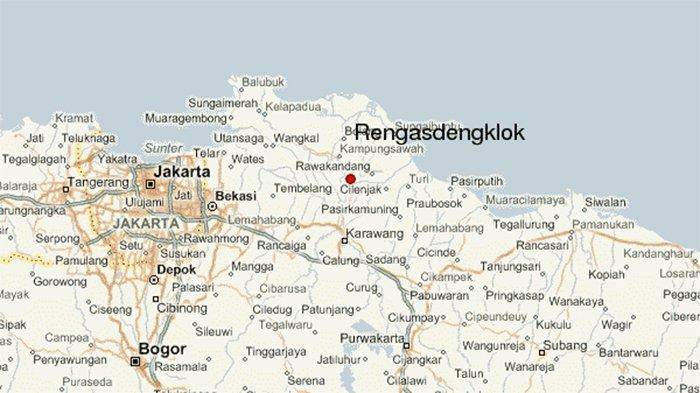
In other words, the Japanese occupied a key point on the road and surrounded themselves on all sides with their Indonesian allies. The 2nd company of the battalion was engaged, in particular, in the control of traffic along the Chitarum River, which flows into the Java Sea, as well as in the observation of aircraft. The road from Rengasdengklok to Jakarta was also guarded and there was a post there.
In March 1945, the Japanese command decided to build field fortifications around Chikampek and sent both Japanese troops and Indonesian battalions there. These works were carried out until mid-August 1945.
As Umar Bakhsan writes, they lived quite isolated from the surrounding society, all the time they had to be either in the service or at the location of the unit. However, in their part there was a youth organization of Indonesian patriots, which at first was actually illegal. After some of its members ended up in the Kempei (Japanese military police) in February 1945, the organization was registered. This was allowed, but there were almost no conditions for political activity. When they could, the members of this organization during their service, at posts and on patrols, little by little agitated the local population.
Shortly before the events of August 1945, representatives of this PETA battalion met with representatives of the battalion that remained in the capital and agreed on joint actions. Umar Bahsan knew about this only in general terms.
Capture of Rengasdengklok
August 16, 1945, Umar Bahsan remembered and described very well, apparently realizing that this was a historic day.
At 07:30 Tokyo time (Japanese military and Indonesian troops subordinate to them lived on metropolitan time), the post in Tajingpur, on the road to Jakarta, called the company, in Rengasdengklok. Squad leader Sediq, who was on duty, asked Umar Bahsan to answer the phone and reported that he had detained two military trucks belonging to PETA with some people.
The time in this part of Java is two hours ahead of Tokyo, meaning the trucks arrived at the post at 05:30 local time. It was still dark, with the sun rising around 06:00 local time. In general, a suspicious situation.
Bahsan found out that the trucks were being escorted by the commander of one of the companies of the PETA battalion in Jakarta, Singgih, with whom he was familiar, and therefore ordered them to pass. At 08:10 Tokyo time, the trucks arrived at the company's location. Singgih informed Bahsan that he had come with Sukarno and Hatta. They were both already wearing PETA uniforms.
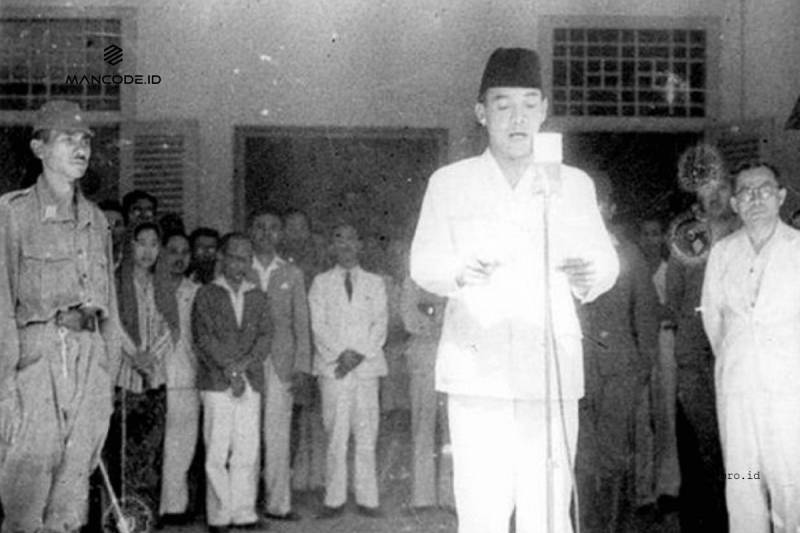
Not much information has been preserved about the Japanese auxiliaries in Indonesia. However, PETA soldiers and officers were caught in a historic photo of the Indonesian Declaration of Independence being proclaimed. Top photo: Sukarno is standing with his back to the photographer, and next to him is an Indonesian in a Japanese uniform and with a katana, apparently one of the PETA officers. In the bottom photo: Sukarno speaking and next to him is the same Indonesian in Japanese uniform. Behind Sukarno is another man in Japanese uniform, but it's hard to tell who it is. The Indonesian auxiliaries were almost indistinguishable from the Japanese in uniform and equipment.
The official version does not deny that Sukarno and Hatta were dressed in military uniforms, this is due to the fact that Japanese posts fired at all cars with civilians who drove at night. Of course, this explanation is most likely wrong. Roads were blocked by posts and a pass was required to pass. The organizers of the transfer of Sukarno and Hatta to Rengasdengklok needed to somehow obtain a night pass for military trucks. They succeeded, but they could not transport civilians in them, and therefore all the “abducted” dressed in military uniforms.
What happened next? Then there was something about which in the official version - not a word. The formation of the company was immediately announced, before which Sukarno and Hatta appeared, making short speeches. Then there were orders.
First, change into combat uniform as quickly as possible, put on equipment and disassemble weapon.
Secondly, the commander of the 2nd division of the 2nd platoon, Ngadam, at the head of the detachment, was to capture the center of the town and arrest the Japanese administration: the local headman (wedana) Abdurakhman and two Japanese - Mitsui and Okawa.
Thirdly, another squad leader, Sukarno (namesake of a political leader), with a 12,7-mm machine gun, was subordinate to Ngadam and had to block the most important roads, including to Jakarta.
The formation ended at 08:45 Tokyo time. The execution of orders began immediately. Already at 09:00 Tokyo time, Rengasdengklok was completely captured and a red and white Indonesian banner was raised over him.
Bahsan wrote down what he remembered, the most remarkable moments. Between 09:00 and 10:00 Tokyo time, Mitsui and Okawa were found and arrested. The Japanese administration in the town was completely paralyzed.
Soon, between 10:00 and 11:00 Tokyo time, an even more remarkable event occurred. A soldier from the Ngadam branch brought five Japanese dressed in civilian clothes. They were detained by one of the posts. They immediately found out that they were all soldiers and one of them was a captain. It was an extraordinary event by the standards of the Japanese Imperial Army. The captain probably already knew that the emperor had accepted the surrender. When they saw the fuss of Indonesian PETA soldiers in the town, they decided that the power was passing into the hands of the locals, and decided to hide. But they taught the Indonesian soldiers well and were detained. What happened to them later, Bahsan does not write.
Sukarno was certainly aware of this incident, as Bahsan specifically indicated that between 11:00 and 12:00 Tokyo time, Sukarno and Hatta were supposed to travel to Jakarta, where a session of the Preparatory Committee for Indonesian Independence was scheduled, but remained at Rengasdengklok. Most likely, they were informed about the situation and noteworthy events.
Around 12:00 Tokyo time, more Japanese appeared. A car arrived with Lieutenant Matsumura, Senior Sergeant Inu, and Junior Sergeant Sato. They came from Chicampec to find out what was going on and why. They were immediately disarmed and detained.
After that, there were no more remarkable events that day. The entire coup took only three hours, from 07:00 to 10:00 local time. Bahsan writes that there was a strange impression. Japanese military trucks and cars used to drive through the town often, but now the roads were completely empty. Since nothing happened, Bahsan even changed into civilian clothes and in this form received a kind of audience with Sukarno.
The leaders got ready to hit the road at 19:30 Tokyo time. Bahsan accompanied them. He was told that tomorrow there would be a declaration of Indonesian independence and warned that if something went wrong and there was no declaration, then they would have to march. The leaders left, and the soldiers remained to wait.
The next day, August 17, 1945, they only learned at 21:00 pm Tokyo time from company commander Latif of the Jakarta battalion PETA that independence had been proclaimed.
What was it?
It was not a "kidnapping" at all. Sukarno, Hatta and others came to Rengasdengklok quite voluntarily and with specific goals.
First, they needed to inspect the armed detachment that would support them, as well as its location as a safe haven, in case something went wrong and had to hide from the Japanese. Yet at the declaration of independence, Sukarno and his supporters had to oppose the Japanese administration, which was still strong despite the surrender. Most likely, Sukarno's supporters from the PETA Jakarta battalion could not guarantee his safety; it is most likely that they also proposed Rengasdengklok, where there were no Japanese units, which was easy to capture and defend.
Secondly, before proclaiming the independence of all Indonesia, Sukarno needed to practice and arrange independence on the scale of at least one single town. This is a rather difficult stage of transformation from an agitator and representative who acts with words to a political leader who orders the soldiers.
Thirdly, Sukarno was very reluctant to go to the meeting of the Preparatory Committee for Indonesian Independence, which was scheduled for that day. He had some reason. The committee met on August 18, 1945, the day after independence was declared, and Sukarno was elected president of the country there. That is, he needed the meeting not before, but after the declaration, so that it would not turn out that he took power from the hands of the Japanese. This was another good reason to go to Rengasdengklok on the night of August 16, as if not of their own free will.
It is difficult to say what plans Sukarno had when he was in Rengasdenklok. But, it seems that the detention of the Japanese captain, who had changed into civilian clothes, and the disarmament of Lieutenant Matsumura, suggested to him a further plan of action. If the Japanese samurai have reached such a degree of disintegration of discipline, it means that the Japanese administration no longer actually has real power in its hands.
Therefore, Sukarno returned to Jakarta (I think that around 21:00 Tokyo time or at 19:00 local time), met with Rear Admiral Tadashi Maeda (a representative of the Navy) and went to the head of the Department of General Affairs of the Japanese military administration, Major General Otoshi Nishimura. A sharp and impartial conversation took place with him, in fact an argument. Now it is clear why Sukarno argued with a high-ranking Japanese boss - precisely because he knew for sure that he was now only a formal boss. Because you could go and demand.
Sukarno did not argue with Major General Nishimura, but he found out that he would not, and could not, interfere with his plans to declare independence. Sukarno and his comrades went to the mansion of Rear Admiral Maeda, where they drew up a declaration of Indonesian independence. After that, the need for PETA soldiers in Rengasdengklok disappeared, so much so that they were informed very late about the event that they were waiting for and preparing.
This is how the story turns out. In this form, it appears logical and consistent, entirely within the framework of preparations for the proclamation of Indonesia's independence. Whatever one may say, this was a risky business, and Sukarno was afraid of the Japanese. Therefore, he prepared and pre-checked a fallback that was not needed.
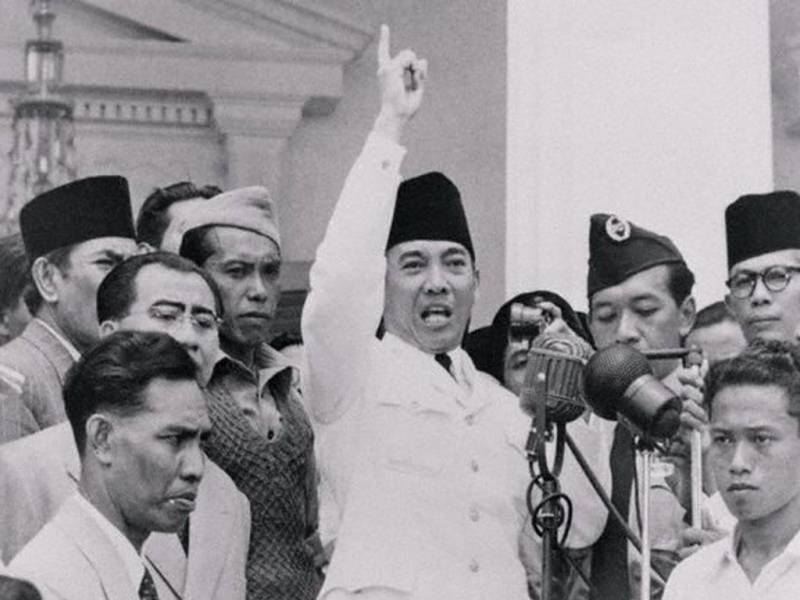
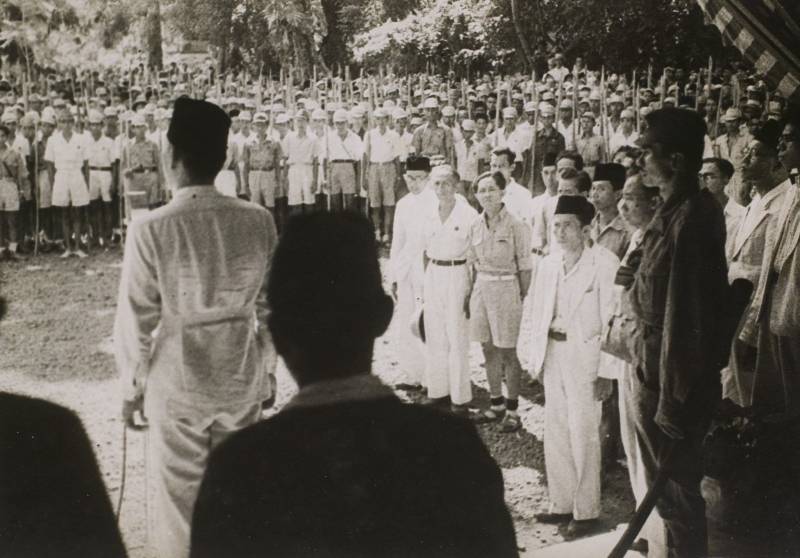
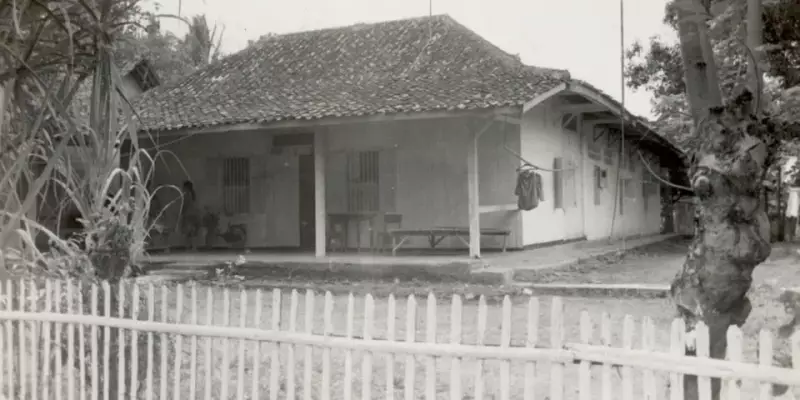
Information